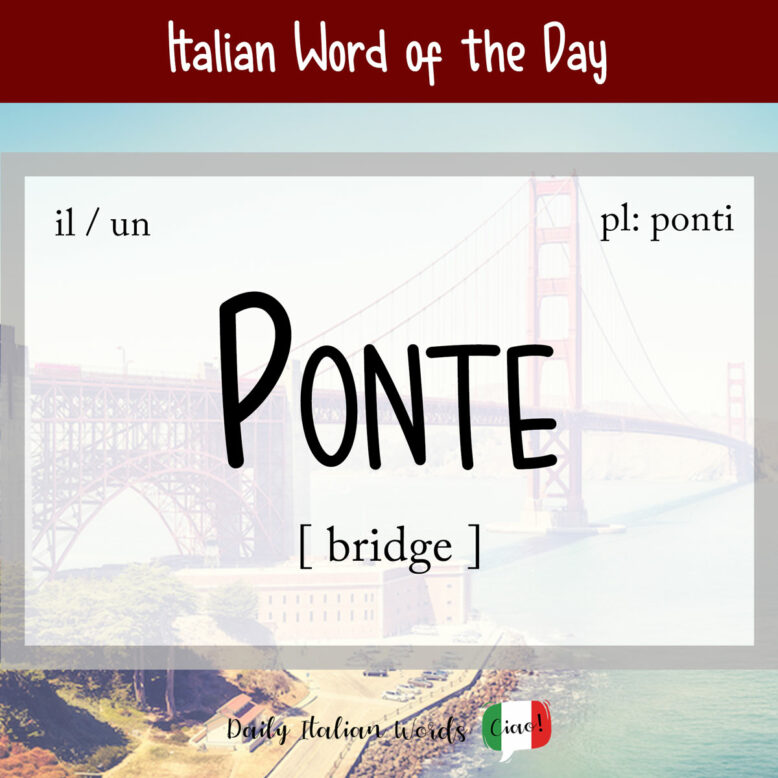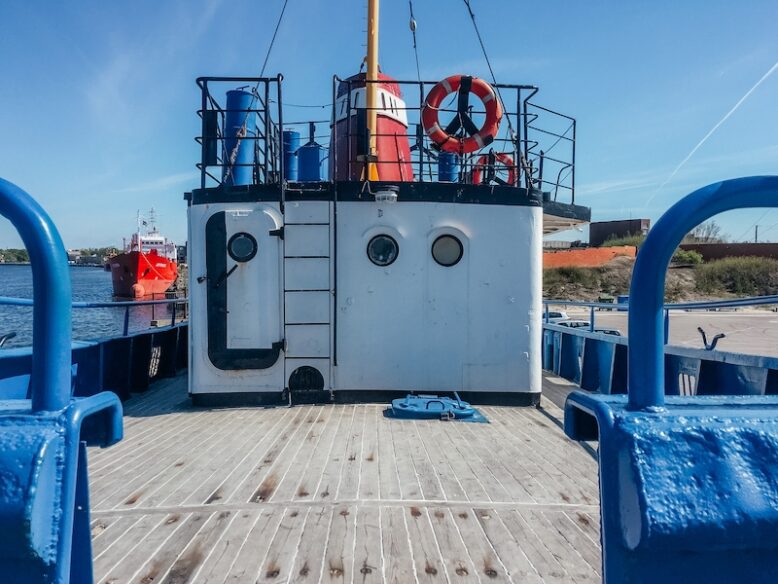Bridges are incredible structures that come in all shapes and sizes, from grandiose masterpieces spanning mighty rivers to humble planks of wood connecting two sides of a bubbling brook. But what is a bridge called in Italian? Let’s find out!

The word for bridge in Italian is ponte, and its plural form is ponti. It derives directly from the Latin word pontem. Because it is a masculine noun, it takes the following definite and indefinite articles:
- il ponte = the bridge
- i ponti = the bridges
- un ponte = a bridge
- (dei) ponti = (some) bridges
The one verb you will most often see used with ponte is attraversare which means to cross.
Dobbiamo attraversare il ponte per arrivare al parco.
We need to cross the bridge to get to the park.

Here are some different kinds of bridges that we encounter in everyday life:
- ponte sospeso = suspension bridge
- ponte mobile / levatoio = drawbridge
- ponte pedonale = pedestrian bridge
- ponte a corda = rope bridge
- ponte ferroviario = railway bridge
- ponte di legno = wooden bridge
- ponte stradale = road bridge
If you have a friend or family member who consistently brings negativity or challenges into your life, you might choose to “cut off ties” with them. In Italian, the equivalent expression is tagliare or rompere i ponti con qualcuno (literally “to cut / break bridges with someone”).
Ho deciso di tagliare i ponti con alcuni dei miei parenti.
I’ve decided to cut off ties with some of my relatives.
Ponte also has the second meaning of deck (of a ship). For example, the bridge of a ship is known as il ponte di comando whereas the upper deck is called il ponte di coperta.

Ponte can also be used to describe any structure or system, be it a bridge or not, that connects two points or things. For this reason, another possible translation is connection or link, as in the term ponte radio (radio link).
A term you may have encountered if you watch a lot of Italian news is governo ponte, which is how Italians refer to a provisional government.
In non-English speaking countries such as Italy, four-day “bridge” weekends are commonplace, taking place when an official holiday falls on either a Thursday or Tuesday. To refer to the act of taking a holiday over a long weekend, Italians use the idiom fare il ponte (literally “to make the bridge”).
Siccome giovedì è festa, venerdì faremo il ponte.
Since Thursday is a holiday, we’ll take the Friday off and have a long weekend.

In dentistry, both bridge and ponte are used to describe a partial denture supported by teeth on either side, whereas in architectural terms, it can refer to a scaffold.
Let’s end off with a couple of figurative expressions using ponte. One is gettare un ponte (literally “to throw a bridge”), which means to close or bridge a gap between two people, countries or cultures. The other is bruciare i ponti (literally, “to burn bridges”), which like the equivalent English expression, refers to the act of leaving a place or a situation in such a way that makes it impossible to go back.
There is a third expression worth mentioning: “Ne è passata di acqua sotto i ponti!“, which literally translates as “A lot of water has gone under the bridges!“. At first glance, you might assume that this expression relates to the English idiom “Water under the bridge,” but in reality, the meaning is different. The Italian expression refers to the passage of a significant amount of time, indicating that something happened a long time ago or that a considerable amount of time has elapsed. On the other hand, the English expression “Water under the bridge,” which signifies that something is no longer important, would be translated in Italian as “acqua passata” (literally, water that has gone).
Heather Broster is a graduate with honours in linguistics from the University of Western Ontario. She is an aspiring polyglot, proficient in English and Italian, as well as Japanese, Welsh, and French to varying degrees of fluency. Originally from Toronto, Heather has resided in various countries, notably Italy for a period of six years. Her primary focus lies in the fields of language acquisition, education, and bilingual instruction.


